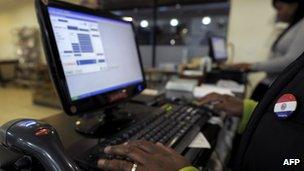Toshiba in $850m deal to buy IBM's point-of-sale unit
- Published

POS systems have become a key part of retailing industry all over the world
Japan's Toshiba Corporation has agreed to buy IBM's point-of-sale (POS) business in a deal worth $850m (£534m; 649m euros).
POS systems are used by retailers to process transactions, manage inventories and analyse sales and consumer data.
The demand for these has been rising as firms look for better ways to retain customers amid growing competition.
The deal will make Toshiba the world's biggest POS system provider.
"Toshiba Tec enjoys a strong presence in retail store solutions in Asia-Pacific, including Japan, and we are confident that this acquisition will support expansion in North America, Europe and the emerging economies," said Norio Sasaki, Toshiba's president and chief executive.
"I also expect this significant step to support innovation and the creation of new business opportunities for Toshiba Group."
IBM's retail store solutions business had revenues of $1.15bn in 2011 and employs approximately 1,000 workers worldwide.
Twin factors
Analysts said while Toshiba was looking to increase its presence in the sector, other factors may have also played a part in its decision, not least a strong Japanese currency.
The yen has risen 12% against the US dollar in the past 12 months, giving Japanese firms greater purchasing power.
That has resulted in Japanese companies going on a buying spree.
According to the Economist Intelligence Unit, Japanese companies did more than 600 such deals in 2011, spending nearly $70bn on them.
"The strong yen is definitely a factor here," Gerhard Fasol of Eurotechnology Japan told the BBC.
At the same time, Japanese firms have had to deal with a stagnant domestic economy and an ageing population, factors which have forced them to look beyond Japan for growth.
"The only way for these firms to grow is by acquiring businesses that have a global presence," said Mr Fasol.
- Published23 March 2012